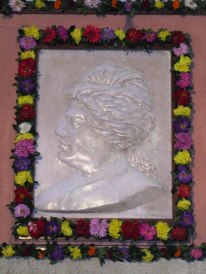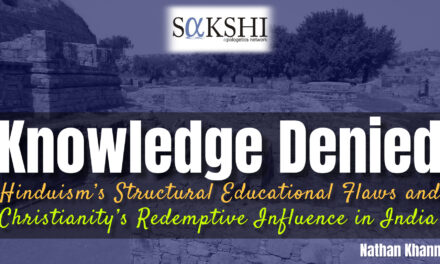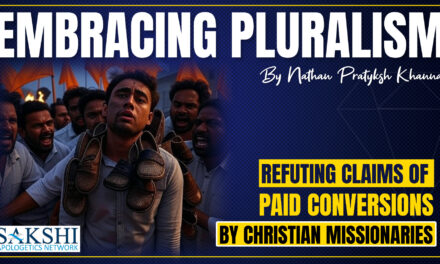 Is Claiming Exclusivity of Truth a Sign of Intolerance and Arrogance?
Is Claiming Exclusivity of Truth a Sign of Intolerance and Arrogance?
While many of the modern Hindu revivalist/reformist, for example Swami Dayananda Saraswati of Arya Samaj, claimed exclusivity for their own understanding of truth and argued against other’s perspective, Swami Vivekananda labeled any claim of exclusivity as a mark of intolerance and claimed that Hinduism accepts all religions as true. Jerry Thomas begins his series of articles refuting the allegations as given in the nine volumes of Complete Works of Swami Vivekananda.
Swami Vivekananda: His Impact on Hinduism
Hardly can a Hindu Christian religious discussion end without Hindus charging Christians of being intolerant and arrogant for claiming exclusivity of truth. Any argument for the uniqueness of Jesus Christ and the salvation that is exclusively offered through Him is not analyzed and debated but is labeled and ignored as religious bigotry.
One need not go too far in the history to find the source of this approach. While many of the modern Hindu revivalist/reformist, for example Swami Dayananda Saraswati of Arya Samaj, claimed exclusivity for their own understanding of truth and argued against other’s perspective, Swami Vivekananda labeled any claim of exclusivity as a mark of intolerance and claimed that Hinduism accepts all religions as true.
In the Complete Works of Swami Vivekananda, Volume 1, Response to Welcome: At the World's Parliament of Religions, Chicago, 11th September, 1893, Swami Vivekananda said:
“My thanks, also, to some of the speakers on this platform who, referring to the delegates from the Orient, have told you that these men from far-off nations may well claim the honor of bearing to different lands the idea of toleration. I am proud to belong to a religion which has taught the world both tolerance and universal acceptance. We believe not only in universal toleration, but we accept all religions as true.” (Emphasis mine).
Further, Swami Vivekananda said that claiming exclusivity in religion is incompatible with love. In the Complete Works of Swami Vivekananda, Volume 3, Lectures from Colombo to Almora; Vedantism; Swami Vivekananda said:
“We have each our Ishta. But when we see men coming and saying, "This is the only way", and trying to force it on us in India, we have a word to say; we laugh at them. For such people who want to destroy their brothers because they seem to follow a different path towards God — for them to talk of love is absurd. Their love does not count for much. How can they preach of love who cannot bean another man to follow a different path from their own? If that is love, what is hatred? We have no quarrel with any religion in the world, whether it teaches men to worship Christ, Buddha, or Mohammed, or any other prophet. "Welcome, my brother," the Hindu says, "I am going to help you; but you must allow me to follow my way too. That is my Ishta. Your way is very good, no doubt; but it may be dangerous for me. My own experience tells me what food is good for me, and no army of doctors can tell me that. So I know from my own experience what path is the best for me." That is the goal, the Ishta, and, therefore, we say that if a temple, or a symbol, or an image helps you to realise the Divinity within, you are welcome to it. Have two hundred images if you like. If certain forms and formularies help you to realise the Divine, God speed you; have, by all means, whatever forms, and whatever temples, and whatever ceremonies you want to bring you nearer to God. But do not quarrel about them; the moment you quarrel, you are not going Godward, you are going backward, towards the brutes.” (Emphasis mine). One need to remember that of the many modern Hindu gurus, Swami Vivekananda is the most influential.
Jyotirmaya Sharma in his book Hindutva: Exploring the Idea of Hindu Nationalism (Penguin Books) writes: “A single event helped create a timeless mystique around Swami Vivekananda. This was his address at the World’s Parliament of Religions in Chicago on 11 September 1893. Even to this day, his address is seen by many as a turning point in Hindu re-assertion and revival.” (Emphasis mine.)
Echoing a similar view, Kenneth W Jones in his book Socio Religious Reform Movements in British India (Cambridge University Press), writes: “The success of Swami Vivekananda stirred many Hindus with an example of spiritual superiority attested to by Westerners themselves.”
Or in other words, Swami Vivekananda succeeded in popularizing Hinduism into a brand. The romanticized Hinduism, which Swami Vivekananda propagated apparently accepts all other religions as true, never persecutes followers of other faiths, and is eternal in its existence, lofty in its ideals, benign in its actions and the source of all other faiths. Despite the enormous evidence to the contrary, for example, Gujarat riots, destruction and brutal persecution of Christians in Orissa, if there are many who still hold on to these views about Hinduism, then the due credit must be given to Swami Vivekananda who was successful in creating such a brand.
In this article, I will be addressing the claim that Hinduism accepts all religions as true. Though there is a mountain of evidence from the history and the Hindu scriptures to disprove this assertion (for example read the article Six Blind Men and an Elephant: Also the Sage who Sees) I will be looking at Swami Vivekananda’s own works to disprove this. If one critically reads Swami Vivekananda’s works, one can observe that contrary to what he declared at the Parliament of World Religions, Swami Vivekananda himself did not regard all religions as true or equal. He in fact believed that other religions are false or inferior. He had raised many allegations against other faiths. He also mentioned that love and respect does not mean accepting everything another person has to say.
In this chapter, I will restrict myself in giving evidences from Swami Vivekananda’s writing to show that he held other religions inferior or even demonic when compared to Hinduism.
Did Swami Vivekananda Believe that All Religions are True? Sometimes Yes, Sometime No.
In the following quotes excerpted from the writings of Swami Vivekananda, one would note that at Swami Vivekananda spoke and wrote even contradictory things depending primarily on the audience. For example, in the Chicago address Swami Vivekananda spoke about Buddha as the fulfillment of Hindu religion, then in Madras he mentioned that Buddha was a Hindu rebel and at another time he wrote that Buddha was a demon.
Buddha- the fulfillment of Hindu Religion: In the Complete Works of Swami Vivekananda, Volume 1, Addresses to the Parliament of Religions, Buddhism, the Fulfillment of Hinduism (26th September, 1893), Swami Vivekananda said:
“The Jews rejected Jesus Christ, nay, crucified him, and the Hindus have accepted Shâkya Muni as God and worship him. But the real difference that we Hindus want to show between modern Buddhism and what we should understand as the teachings of Lord Buddha lies principally in this: Shâkya Muni came to preach nothing new. He also, like Jesus, came to fulfill and not to destroy. Only, in the case of Jesus, it was the old people, the Jews, who did not understand him, while in the case of Buddha, it was his own followers who did not realize the import of his teachings. As the Jew did not understand the fulfillment of the Old Testament, so the Buddhist did not understand the fulfillment of the truths of the Hindu religion. Again, I repeat, Shâkya Muni came not to destroy, but he was the fulfillment, the logical conclusion, the logical development of the religion of the Hindus.”
Buddha and Christ- Second Rate Heroes: In the Complete Works of Swami Vivekananda, Volume 1, Karma Yoga, Chapter VI: Non-attachment is complete self-abnegation, Swami Vivekananda wrote:
“The Buddhas and the Christs that we know are but second-rate heroes in comparison with the greatest men of whom the world knows nothing. Hundreds of these unknown heroes have lived in every country working silently. Silently they live and silently they pass away; and in time their thoughts find expression in Buddhas or Christs, and it is these latter that become known to us.” (Emphasis mine.)
Further he wrote:
“The highest kind of men silently collect true and noble ideas, and others — the Buddhas and Christs — go from place to place preaching them and working for them. In the life of Gautama Buddha we notice him constantly saying that he is the twenty-fifth Buddha. The twenty-four before him are unknown to history, although the Buddha known to history must have built upon foundations laid by them. The highest men are calm, silent, and unknown.” (Emphasis mine.)
Buddha, Christ and Krishna: A Drop of Mother (Kali): In the Complete Works of Swami Vivekananda, Volume 7, in his speech titled The Divine Mother, recorded by Miss S E Waldo, a disciple dated July 2, 1895, Swami Vivekananda said:
“A bit of Mother, a drop was Krishna, another was Buddha, and another was Christ. The worship of even one spark of Mother in our earthly mother leads to greatness. Worship Her if you want love and wisdom.” (Emphasis mine.)
Mother is the Greatest and Next is Buddha and Christ: In the Complete Works of Swami Vivekananda, Volume 7, in his speech recorded by Miss S E Waldo, a disciple dated July 3, 1895, Swami Vivekananda said:
“The Absolute cannot be worshipped, so we must worship a manifestation, such a one as has our nature. Jesus had our nature; he became the Christ; so can we, and so must we. Christ and Buddha were the names of a state to be attained; Jesus and Gautama were the persons to manifest it. "Mother" is the first and highest manifestation, next the Christs and Buddhas.” (Emphasis mine.)
Buddha and Christ – Inferior to Krishna: In the Complete Works of Swami Vivekananda, Volume 9, Gita Class, Sister Nivedita's notes of a New York Bhagavad-Gitâ class, recorded in a June 16, 1900 letter to Miss Josephine MacLeod, records the speech of Swami Vivekananda thus:
“There was an implication throughout the talk that Christ and Buddha were inferior to Krishna — in the grasp of problems — inasmuch as they preached the highest ethics as a world path, whereas Krishna saw the right of the whole, in all its parts — to its own differing ideals.” (Emphasis mine.)
Shri Ramakrishna Greater than Christ, Buddha and Krishna: In the Complete Works of Swami Vivekananda, Volume 5, Econcilation of Jnana and Bhakti- Sat- Chit- Ananda- how sectarianism originates- bring in sharddha and the worship of shakti and avatars- the ideal of hero we want now, not the Madhura Bhava- Shri Ramakrishna avatars, Swami Vivekananda said to his disciple:
“Swamiji: Tell me first — what do you mean by an Avatara?
Disciple: Why, I mean one like Shri Ramachandra, Shri Krishna, Shri Gauranga, Buddha, Jesus, and others.
Swamiji: I know Bhagavan Shri Ramakrishna to be even greater than those you have just named. What to speak of believing, which is a petty thing — I know! Let us, however, drop the subject now; more of it another time.” (Emphasis mine.)
Buddhism a Rebel Child, Christianity a Patchy Imitation of Hinduism: In the Complete Works of Swami Vivekananda, Volume 3, the work before us: Delivered at the Triplicane Literary Society, Madras, Swami Vivekananda said:
“Before even the Buddhists were born, there are evidences accumulating every day that Indian thought penetrated the world. Before Buddhism, Vedanta had penetrated into China, into Persia, and the Islands of the Eastern Archipelago. Again when the mighty mind of the Greek had linked the different parts of the Eastern world together there came Indian thought; and Christianity with all its boasted civilisation is but a collection of little bits of Indian thought. Ours is the religion of which Buddhism with all its greatness is a rebel child, and of which Christianity is a very patchy imitation. One of these cycles has again arrived.” (Emphasis mine.)
Buddha a Demon who Ruined India, Christ Ruined Greece and Rome : In the Complete Works of Swami Vivekananda, Volume 5, the East and the West, Swami Vivekananda called Buddha as a demon. However, the editor of the Complete works added in the parenthesis that Swami Vivekananda later changed this view in 1902. The question that remains is – if the change happened in 1902, what about the message at the Parliament of Religions in 1893, where he mentioned that Buddha was the fulfillment of Hinduism? Let the readers make a conclusion about such contrary stands at different times. The quote is given below:
“On the advent of Buddhism, Dharma was entirely neglected, and the path of Moksha alone became predominant. Hence, we read in the Agni Purâna, in the language of similes, that the demon Gayâsura — that is, Buddha (Swamiji afterwards changed this view with reference to Buddha, as is evident from the letter dated Varanasi, the 9th February, 1902, in this volume.) — tried to destroy the world by showing the path of Moksha to all; and therefore the Devas held a council and by stratagem set him at rest for ever.” (Emphasis mine.)
Further in the same work, Swami Vivekananda wrote:
“It is only the Vedic religion which considers ways and means and lays down rules for the fourfold attainment of man, comprising Dharma, Artha, Kama, and Moksha. Buddha ruined us, and so did Christ ruin Greece and Rome! Then, in due course of time, fortunately, the Europeans became Protestants, shook off the teachings of Christ as represented by Papal authority, and heaved a sigh of relief. In India, Kumârila again brought into currency the Karma-Mârga, the way of Karma only, and Shankara and Râmânuja firmly re-established the Eternal Vedic religion, harmonizing and balancing in due proportions Dharma, Artha, Kama, and Moksha.” (Emphasis mine.)
Muhammad- The Danger of Being Not a Trained Yogi: In the Complete Works of Swami Vivekananda, Volume 1, Raja Yoga, CHAPTER VII: Dhyana and Samadhi, Swami Vivekananda wrote:
“The Yogi says there is a great danger in stumbling upon this state. In a good many cases there is the danger of the brain being deranged, and, as a rule, you will find that all those men, however great they were, who had stumbled upon this superconscious state without understanding it, groped in the dark, and generally had, along with their knowledge, some quaint superstition. They opened themselves to hallucinations. Mohammed claimed that the Angel Gabriel came to him in a cave one day and took him on the heavenly horse, Harak, and he visited the heavens. But with all that, Mohammed spoke some wonderful truths. If you read the Koran, you find the most wonderful truths mixed with superstitions. How will you explain it? That man was inspired, no doubt, but that inspiration was, as it were, stumbled upon. He was not a trained Yogi, and did not know the reason of what he was doing. Think of the good Mohammed did to the world, and think of the great evil that has been done through his fanaticism! Think of the millions massacred through his teachings, mothers bereft of their children, children made orphans, whole countries destroyed, millions upon millions of people killed!” (Emphasis mine.)
Brahmo Samaj and Arya Samaj- Apology to the English Masters: In the Complete Works of Swami Vivekananda, Volume 8, in his letter from Ridgely Manor, dated, 30th October, 1899 and addressed to ‘dear optimist,’ Swami Vivekananda wrote:
“As for religious sects — the Brahmo Samaj, the Arya Samaj, and other sects have been useless mixtures; they were only voices of apology to our English masters to allow us to live! We have started a new India — a growth — waiting to see what comes. We believe in new ideas only when the nation wants them, and what will be true for us. The test of truth for this Brahmo Samaj is "what our masters approve"; with us, what the Indian reasoning and experience approves. The struggle has begun — not between the Brahmo Samaj and us, for they are gone already, but a harder, deeper, and more terrible one.” (Emphasis mine.)
Why the Contradictory Stances?
The question that arises is- why did Swami Vivekananda speak contradictory things on the same subject? Is it because Swami Vivekananda himself evolved over a period of time in his thoughts? Or was he practicing a clever tactic to promote Hinduism? Though one can never be sure of the reasons, the evidence seems to be indicating the later.
For example, while submitting the sayings of Shri Ramakrishna to Prof. Max Muller, Swami Vivekananda instructed to avoid anything that contradicts the supposedly universal aspects of Hinduism.
In the Complete Works of Swami Vivekananda, Volume 6, in his letter to Shashi, addressed from 63 ST. GEORGE'S ROAD, LONDON S.W., 24th June, 1896, Swami Vivekananda wrote:
“Max Müller wants all the sayings of Shri Ramakrishna classified, that is, all on Karma in one place, on Vairagya in another place, so on Bhakti, Jnana, etc., etc. You must undertake to do this forthwith. … We must take care to present only the universal aspect of his teachings.” (Emphasis mine.)
Further, in admitting non-Hindu boys to Ashramam, Swami Vivekananda again instructed to teach only the universal side of religion.
In the Complete Works of Swami Vivekananda, Volume 6 in his letter to Akhandananda, addressed from MURREE, 10th October, 1897, Swami Vivekananda wrote:
“Admit boys of all religions — Hindu, Mohammedan, Christian, or anything; but begin rather gently — I mean, see that they get their food and drink a little separately, and teach them only the universal side of religion.” (Emphasis mine.)
An Appeal to Hindus: Love and Respect Does Not Mean Uncritical Acceptance of Views
As Christians we love and respect our Hindu brothers and sisters. However this does not mean that we accept everything that a Hindu says. We will critically evaluate it and test everything.
A group of Christians in Thessalonica were accepting everything that Apostle Paul says. Even though it was an Apostle who was speaking, the Holy Spirit did not appreciate that. In Acts 17:11 we read: "Now the Bereans were of more noble character than the Thessalonians, for they received the message with great eagerness and examined the Scriptures every day to see if what Paul said was true." In fact, the Holy Spirit commanded the same Thessalonians through the same Apostle in I Thessalonians 5.21: “Test everything. Hold on to the good." That is the rigor which is expected of a Christian from our God.
Now a few Hindus might it find it difficult to accept. Should we test everything that is in the realm of faith? Should we be critical of each other? If you find it difficult to accept, then read the following quotes from Swami Vivekananda who wrote this in another context.
In the Complete Works
of Swami Vivekananda, Volume 3, in the work titled My Plan of Campaign, Delivered at the Victoria Hall, Madras, Swami Vivekananda said:
“For that, the eternal gratitude of every trueborn Indian is hers (Mrs. Besant), and all blessings be on her and hers for ever. But that is one thing — and joining the Society of the Theosophists is another. Regard and estimation and love are one thing, and swallowing everything any one has to say, without reasoning, without criticizing, without analyzing, is quite another.” (Emphasis and words in parenthesis are mine.)
Can a Christian also say that I respect and love Hindus but that does not mean that I will accept everything that they say as correct? How can a Christian be accused of hate and intolerance when he says the same thing?
Is it not sophistry to say “How can they preach of love who cannot bear another man to follow a different path from their own? If that is love, what is hatred? We have no quarrel with any religion in the world, whether it teaches men to worship Christ, Buddha, or Mohammed, or any other prophet” and in the same breath write “Regard and estimation and love are one thing, and swallowing everything any one has to say, without reasoning, without criticizing, without analyzing, is quite another.”
In fact, after examining the veracity of the Holy Bible, we believe in the supremacy of the Holy Bible. If anything in the Vedas or Puranas or any Hindu literature agrees with the Holy Bible, then we will accept those as true. If anything in the Vedas or Puranas or any Hindu literature contradicts with the Holy Bible, then we will reject those as false.
If any Hindu finds this as offensive, arrogant and as an attitude of intolerance, then read the following quote from Swami Vivekananda.
In the Complete Works of Swami Vivekananda, Volume 3, The Vedanta in All Its Phases (Delivered in Calcutta), Swami Vivekananda wrote:
“Sutras are subordinate to the authority of the Vedas. They are the words of the Rishis, our forefathers, and you have to believe them if you want to become a Hindu. You may even believe the most peculiar ideas about the Godhead, but if you deny the authority of the Vedas, you are a Nâstika. Therein lies the difference between the scriptures of the Christians or the Buddhists and ours; theirs are all Puranas, and not scriptures, because they describe the history of the deluge, and the history of kings and reigning families, and record the lives of great men, and so on. This is the work of the Puranas, and so far as they agree with the Vedas, they are good. So far as the Bible and the scriptures of other nations agree with the Vedas, they are perfectly good, but when they do not agree, they are no more to be accepted. So with the Koran. There are many moral teachings in these, and so far as they agree with the Vedas they have the authority of the Puranas, but no more.” (Emphasis mine.)
Since both Hindus and Christians believe that their respective texts are standard to measure each other, there are a lot of issues which we will consider each other as in error.
What are we going to do with those? Leave those as matters of faith? No. That is against the command to test everything.
We have to discuss those and give reasons. Those reasons should include not only the hair splitting logical coherence but also the empirical evidence and the existential relevance.
In the following series of articles, I will be presenting the Christian case against many of Swami Vivekananda’s misinterpretations and allegations against the Biblical faith. This is with the intention that Hindus might consider accepting Jesus Christ as their LORD and Savior as revealed in the Holy Bible. I hope that this statement will no longer be treated as arrogant and intolerant and thus ignored but will be critically examined to see the veracity of its truth.
Note: Due to the upcoming programs, this series of articles will take a few months. God willing, it will be done for the glory of Jesus Christ.
{moscomment}




